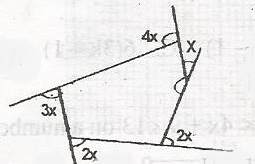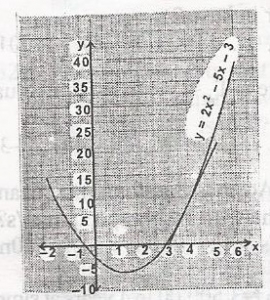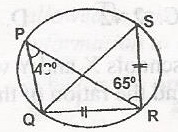1
\(\frac{3}{2}\)
2
\(\frac{5}{2}\)
Correct answer is B
9(2 - x) = 3
32(2 - x) = 3
2(2 - x) = 1
4 - 2x = 1
-2x = 1 - 4
-2x = -3
x = \(\frac{-3}{-2}\)
x = \(\frac{3}{2}\)
Multiply 2.7 x 10-4 by 6.3 x 106 and leave your answers in standard form
1.7 x 103
1.70 x 103
1.701 x 103
17.01 x 103
Correct answer is C
2.7 x 10-4 x 6.3 x 106
= 2.7 x 6.3 x 10-4 x 106
= 17.01 x 10-4 + 6
= 17.01 x 102
= 1.701 x 101 x 102
= 1.701 x 101 + 2
= 1.701 x 103

The diagram is a polygon. Find the largest of its interior angles
300o
100o
120o
150o
Correct answer is D
Sum of interior angles = 3602
i.e 3x + 2x + 2x + x + 4x = 360o
12x = 360
x = \(\frac{360}{12}\)
x = 30o
x + c = 180
30o + c = 180
c = 180 - 30
c = 150o

-\(\frac{1}{2} \leq x\) < 3
-\(\frac{1}{2} < x \leq 3\)
-\(\frac{1}{2} < x < 3\)
-\(\frac{1}{2} \leq x \leq 3\)
Correct answer is C
2x2 - 5x - 3 = 0
2x2 - 6x + x - 3 = 0
2x(x - 3) + 1(x - 3) = 0
(2x + 1)(x - 3) = 0
2x + 1 = 0
2x = -1
x = -\(\frac{1}{2}\)
x - 3 = 0
-\(\frac{1}{2}\) < x < 3

In the diagram, |SR| = |QR|. < SRP = 65o and < RPQ = 48o, find < PRQ
65o
45o
25o
19o
Correct answer is D
< RSQ = < RPQ = 48o (angle in the same segment)
< SQR < RSQ (Base angle of an isosceles \(\bigtriangleup\))
< SQR = 480
< QRS + < RSQ + < RSQ = 180o(sum of interior angles of a \(\bigtriangleup\))
i.e. < QRS + 48o + 48o = 180
< QRS = 180 - (48 + 48) = 180 - 96 = 84o
but < PRQ + < PRS = < QRS
< PRQ = < QRS - < PRS - 84 - 65
= 19o
WAEC Subjects
Aptitude Tests